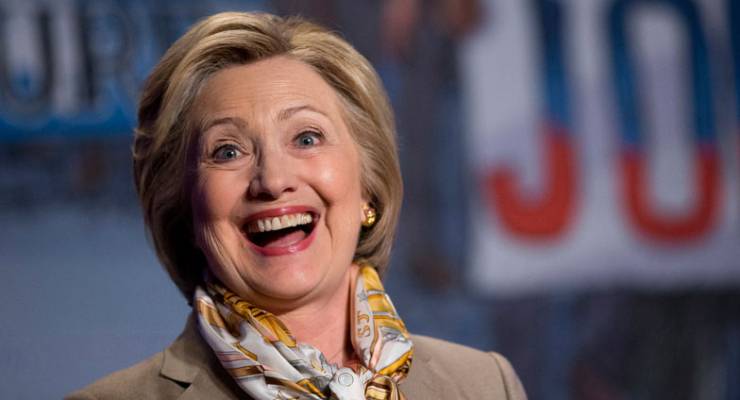
With The New York Times rating Hillary Clinton’s chances of victory in November’s presidential elections at 88%, the United States finally seems on course to inaugurate its first female head of state — almost 28 years after Benazir Bhutto became the first elected leader female leader of a Muslim-majority nation.
As announced by headlines like “Dawn of a female world order” (The Daily Express), “From Teresa May to Hillary Clinton: the march of the sisterhood” (the Financial Times), “Women rising from the political ashes of men” (The Guardian), Clinton would join British Prime Minister Theresa May, German Chancellor Angela Merkel and International Monetary Fund managing director Christine Lagarde in a league of powerful global women.
While we seem to stand at the brink of an era of unprecedented female power, the case of Benazir Bhutto illustrates that it is perfectly possible for a nation to elect a female leader while remaining patriarchal to its core and for that leader to find herself unable to challenge institutional patriarchy while in office.
As Helen Razer noted in an article for last week’s Crikey, an article by Michelle Cottle in The Atlantic is among those to forecast that Clinton’s election will usher in an era of misogynist backlash as her enemies retaliate against “the bitch”. And Cottle’s article also revisits claims about race and gender made during the 2008 contest for the Democratic candidacy when Gloria Steinem wrote the respective cases of Clinton and Obama illustrated that “the sex barrier is not taken as seriously as the racial one”.
Now, with Obama about to depart the White House and Clinton on course to enter it, political scientist Jennifer Lawless tells Cottle, again citing Clinton and Obama, that “sexism is more acceptable than racism”.
It’s a claim supported by our own first female Prime Minister, who told The Atlantic:
“If Australia had an aboriginal Australian prime minister and the opposition leader went and stood in front of signs that said, ‘Sack the black,’ or inserted any of the dreadful words we have for aboriginal Australians, it would have been a career-ending moment And if an indigenous Australian prime minister had complained about that, I don’t think people would say, ‘Oh, he is just playing the victim.”
This misses the obvious point that Australia has never had an Aboriginal Prime Minister. Nor are any likely contenders for the position waiting in the wings. Those Aboriginal politicians who have been elected to state and federal parliaments have faced racism as brutal as any of the sexist attacks upon Gillard — often from members of their own parties. And Aboriginal politicians such as Nova Peris have most certainly been accused of “playing the victim” (aka “the race card”) even before they complained about it.
Gillard’s argument ignores, too, the pattern of nominating Aboriginal candidates for the Senate rather than the House of Representatives so that they will be less visible and cause less damage to their party’s brand among “mainstream Australians”, never mind the structural impediments that hinder Aboriginal people from even participating in the political process in the first place.
Aboriginal Senator Pat Dodson has said that “the more Aboriginal people in Parliament, the better” no matter their party affiliation because “it sends a good message to the Australian public about the leadership capacities, dedication, and interests Aboriginal people can have”. Similar claims have been made about the presence of women in Parliament, and it is hard to disagree with the need for greater political diversity with regards to both gender and race. And hard to disagree with the need to support those who are targeted by racist and sexist attacks, regardless of their political affiliation. However, the type of unqualified solidarity from one’s own ethnic or racial (let alone religious) community of the type that women are told we “owe” Gillard and Clinton would be regarded as dangerously tribal.
And white women have long supplanted white men in Spivak’s much-cited quote about colonialism as “white men saving brown women from brown men”. Julia Gillard maintained the Howard-era intervention in Aboriginal communities in the Northern Territory undertaken in the name of rescuing women and children from abuse.
Hillary Clinton’s record suggests that when she chooses to flex her feminist muscle, it will be in the form of military intervention against patriarchs far from home. Despite the brutality of Gaddafi’s dictatorship, it is unlikely that Libyan women have found much to laugh about in Clinton’s response to his death (“We came, we saw, he died”) as their country has descended further and further into the abyss.
Steinem’s 2008 article about Clinton and Obama claimed that the sex barrier is taken less seriously than the racial one because “sexism is confused with nature as racism once was”. However, I would suggest that having experienced sexism, successful white women such as Steinem and Gillard are able to recognise it when they see it, whereas racism is so pervasive and taken for granted that they do not notice it, even when it is staring them in the face — and even when they are the ones dishing it out.








Not sure what the point of this article is. Is it that white women don’t recognise racism because they are white? If so then is the answer that to combat both racism and sexism we need black women as leaders because white women have failed?
Please, can we call a moratorium on articles focussed on asserting one group’s winning position in the victim hood competition? Different people can be victimised in different ways and i doubt very much that “I’m (or they’re) more of a victim than you (or them)” stories advances anyone’s interests, regardless of the groups involved. The mere headline Is tedious.
Ms Hussein as usual arguing from her ekstra speshal pedestal.
Short version, “it’s a black thang, you wouldn’t undertand – having a melatonin deficient brain “.